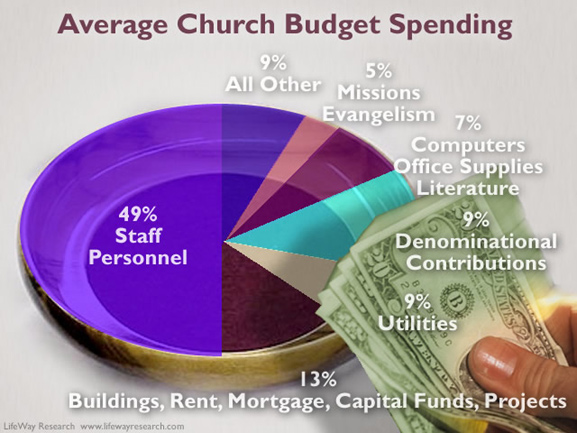In my post, There is no Biblical defense for Paid Pastors/Elders, I pointed out the flaws in the arguments used to support paying men a salary to do work that all followers of Christ have been called to do. A few years ago I wrote a post called Resources, Conversions, and Priorities… where I questioned the priorities our traditional churches had using this data from a Lifeway study.
Based on this information our churches spend less than 23% of the money they receive in tithes and offerings on actually reaching out to people in need. That’s right, the average church spends three quarters of its non-profit donations on itself and a whopping 49% goes towards “personnel” the majority of which is the Senior Pastor’s salary.
Today’s pastors and elders do a lot of things, a lot of things that are not found in scripture and a lot of things that are found in scripture. The problem is that all of the things found in scripture are asked of all followers of Christ, the things that are not found in scripture have no bearing on the good news. Unfortunately, when we pay someone to do one part, many people associate that with paying them to do the other part of their responsibility.
Here are some practical thoughts about what it would look like if we did not pay pastors and elders a salary.
Who is responsible for ministering?
The fact is, YOU are responsible for ministering to others. Paying a pastor does not remove that responsibility from your shoulders. It does, however, limit your ability to minister to other financially.
What about sharing the gospel?
Your pastor has loads of free time, now that you’re paying his salary. So he can go out and witness to the world, right? Well, sure… but who is he reaching out to? Who isn’t he reaching out to? If he worked, could he share the good news about Jesus with his coworkers? Could he still hit the gym after work or during lunch and talk about Jesus to others? What about while he shops?
The responsibility of sharing our lives in Christ does not fall on the shoulders of a paid pastor, it falls on the shoulders of every man, woman, and child whose lives have been changed by Jesus.
What about discipleship?
It is hard work to make disciples and keep them. Sometimes disciples come and go, sometimes they stay, sometimes they sell you out for 30 silver pieces. Unfortunately, it is not only the pastor’s duty to make disciples, all Christ followers are charged with this task. So why are we paying almost half of the churches budget on a few men to do the work that everyone is being asked to do? Make disciples at work, make disciples at the playground with your kids, make disciples at the gym, at the grocery store, while training for your marathon. These things are not limited to one man who makes a salary, these things are natural expressions of the change that is found within us.
What about the sick?
Frankly, I would much rather have someone visit me if they care about me. Not some man who is getting paid to visit me. I know people have lives, people are busy. I am busy, I have a lot of things going on. But isn’t that what makes it special? To know that your brothers and sisters in Christ are sacrifice their needs in order to meet yours.
Who will prepare the sermon?
The Sunday sermon has become the major focal point of the vocational pastor’s duties. You would think that they’ve studied the scriptures long enough to know that the Sunday morning sermon cannot be defended by the scriptures. Ignoring that fact, why can’t anyone prepare a message? I know, I know… heresy might leak into the congregation. That could never happen if there was a single man who preached every Sunday… oh, wait. Heresy will leak in no matter who is giving the message. Look at the scriptures, you will see that it is the duty of the whole church to correct each other.
This all sounds too messy!
Life is messy. The church is messy. Things will get messy. But Jesus is there to help us. And we need to be there for each other, to love each other, to guide each other, to disciple each other, to teach each other, to care for each other.
Imagine how much more we could do if 75% of our money wasn’t being spent on a few salaries and a building fund.


